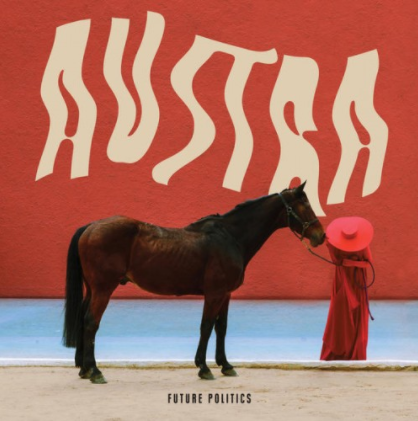In spite of being a Canadian-based band, there is something decidedly American (or United Statesian, if you want to split hairs) about the way in which Austra’s third album, Future Politics, addresses the state of things now. Though Donald Trump is a problem that only the U.S. technically has to “deal with,” there’s no denying the effects of his doltery are going to be felt the world over. Thus, it is only fitting that the quartet should release their record on January 20, also known as inauguration day.
On a sonic journey that explores not only the dangerous ways we live now (addicted to non-reality, tied to our screens all day, etc.), Austra holds nothing back in expressing their desire for a better world, one that has yet to be established. “We Were Alive” is the mid-tempo track that commences the poignant notion examined throughout all of Future Politics, which is that detachment and indifference has led to much of the problems facing us now. The question “What if we were alive?” calls into the spotlight the intense apathy that has led to the point of Trump being permitted to enter office in the first place.
Bearing both the air of hope and matter-of-factness required to get through this current trying time, “Future Politics” features a jubilant beat that offers up the final, yet hopeful sentiment, “I’m never coming back here/There’s only one way, future politics.” Iterating that “the system won’t help you when your money runs out,” it feels as though lead vocalist Katie Stelmanis wishes to start anew in a world without the falsity of boundaries that separate people—race, socioeconomic status and gender being the most overt limiters.
The sound of “Utopia” utilizes Stelmanis’ innate operatic ability to provide the sort of soundtrack that one could indeed imagine serving as the anthem for entering a utopia that is free of political tyranny, a place that accepts everyone as they are. The self-deprecating “I’m A Monster” again showcases Stelmanis’ classical opera training as she opens the song with controlled vocals that sound like they might be on the brink of bursting into something more visceral. But it is not so as, throughout the entire track, Stelmanis detachedly questions, “How do I feel nothing anymore?/I don’t feel nothin’ anymore.” Again, this speaks to the constant theme of apathy as a detriment throughout Future Politics.
The heartrending “I Love You More Than You Love Yourself” works on manifold levels with regard to interpretation. On the one, straightforward hand, it is Stelmanis telling her lover that she clearly doesn’t possess the self-esteem to know her true value, and on the other, it’s about how little we as a populace value ourselves to let the people who “control” us get into power.
The futuristic and ethereal “Angel In Your Eye” offers the sort of gritty instrumentals that upgrade the era in which so much synthpop got people through eight years of Ronald Reagan. “The fever grows” is the ominous lyric that applies to a certain latent revolution just waiting to bubble to the surface.
Continuing the frenetic futurism of the album is “Freepower,” another seeming update to an 80s auditory motif. Chanting, “If only you were true, if only,” Stelmanis could just as easily be speaking of a lover as a politician, a preferred interchangeability on many instances of the album. After all, what two entities have more power over how we live our lives?
“Gaia” is a protective-of-Mother Nature track that insists, “The physical world is the only world/If you kill the ground you walk on, nobody will take you anywhere.” As a word that means the personification of Earth, Stelmanis, too, addresses concerns over an increasingly deteriorating and uncared for environment that will undoubtedly lose a slew of advocates under the Trump presidency.
Bordering on an almost Enya-infused nature, “Beyond A Mortal” endures with politically tinged sentiments that include the lyric, “I’m in love with your color.” Stelmanis has got to be talking about more than auras in this case. Slowly fading out with a moody guitar riff, we’re left with the intervention of the synth to provide a sort of beautiful war between the two instruments. If only the war between races could be deemed so beautiful.
“Deep Thought” is the aural embodiment of this very phrase, with its contemplative harp arrangements punctuating a pensiveness that segues seamlessly into “43.” Faintly foreboding humming opens the track and persists throughout, paired with Stelmanis’ inquiry, “Do you acknowledge what I’m saying?” It’s a question that, indeed, bears frequent repeating in an epoch where disaster politicism reigns supreme.




















